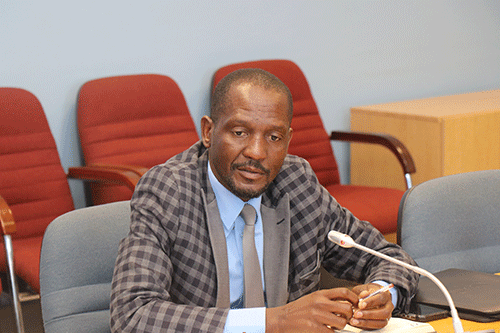Gearge Sanzila
Member of Parliament and Deputy Minister of Works and Transport, Veikko Nekundi has accused commercial banks of discriminatory practices despite Namibia having attained independence over 30 years ago.
Nekundi said this to the Parliamentary Standing Committee on Economics and Public Administration during consultative meetings on two motions tabled by Nekundi and fellow MP Agnes Kafula, which were referred to the standing committee for further investigation and recommendation.
Nekundi recently tabled a motion “to investigate the overcharges and unethical multiple charges resulting into over profiteering by commercial banks in Namibia and perpetual colonial legacy of class and race discrimination against their clients” whereas Kafula’s motion is on the “Social Protection of Informal Economy Sector”.
According to committee chairperson, Natangwe Ithete, the referral of the motions necessitated the need for consultations in order to fully understand their aims before the committee can continue with its work.
“We have called you in so that we understand your intention with this motion, so that when we begin our work of investigating what is contained, we cannot misconstrue the true goals,” stated Ithete.
According to Nekundi, commercial banks continue to discriminate their clients according to class and race, further adding that Parliament had the power to reverse discrimination.
“Interest charged by banks is discriminatory as the comparison of assets are what is determining the amount of interest one has to pay. Most of the previously advantaged people acquired their wealth and benefited from the apartheid regime at the expense of the masses. When we both go to the banks to borrow money, we are left disadvantaged because we do not have assets compared to those that benefited from the apartheid regime. Banks should be able to assess borrowers according to assets they acquired legitimately,” argued Nekundi.
He further described lending rates by banks as oppressive and a hegemonic system intended only to benefit a few and derive maximum profits from the poor and the economically disadvantaged in violation of the constitution.
“Why do you think banks have three tier lending rates, the prime, the prime less and prime plus? How many black loans are restructured? According to my basic research from last year, a loan application from a black person takes three times longer to be approved. In addition, blacks receive a very low average rating score,” bemoaned the lawmaker.
Kafula, while giving input on her motion, noted that despite the informal sector accounting for over 12% of Namibia’s GDP and absorbing more than 57% of the workforce, it continues to be pushed to the periphery amidst a host of challenges.
“After over 30 years of independence, the informal sector continues to be overlooked and not given the priority it deserves. It continues to feature less on the priority list of our national development agenda. It is understood as an unorganised, unproductive, backward, unscientific and primitive to play a meaningful role in the economy of the country,” complained Kafula.
She further implored local authorities to stop what she termed the harassment of vendors and traders, proposing the introduction and expansion of social protection systems by government and the implementation of already existing policies.
“I would like to propose that local authorities provide appropriate facilities and enough trading areas for vendors and traders suitable to their customers and markets. I urge them to establish informal economy committees that would include representatives of the informal economy sectors. Business organisations must recognise the informal sector as a partner in the national economy,” appealed Kafula.
The Parliamentary Standing Committee on Economics and Public Administration has the duty to monitor, enquire and make recommendations to the National Assembly on matters that may directly or indirectly affect the economy, natural resources and public administration of Namibia and its people.
*George Sanzila works for the National Assembly in the Division: Research, Information, Publications and Editorial Services.


